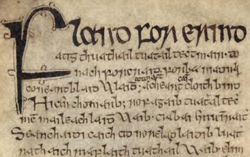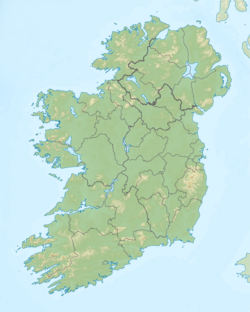Great Book of Lecan
| Leabhar Mór Leacain | |
|---|---|
| Royal Irish Academy (302 leaves) Trinity College Library | |
 | |
| Also known as | Great Book of Lecan |
| Type | Compilation of Irish legends |
| Date | between 1397 and 1418 |
| Place of origin | Clonmacnoise |
| Language(s) | Middle Irish |
| Scribe(s) | Giolla Íosa Mór Mac Fhirbhisigh, Ádhamh Ó Cuirnín |
| Material | Vellum |
| Size | 32cm x 22cm |
| Format | Folio |
| Condition | Pages covered in greasy material |
| Script | Irish minuscule |
| Contents | genealogy, history, hagiography |
The (Great) Book of Lecan (Irish: Leabhar (Mór) Leacain) (RIA, MS 23 P 2) is a medieval Irish manuscript written between 1397 and 1418 in Castle Forbes, Lecan (Lackan, Leckan; Irish Leacan) in the territory of Tír Fhíacrach, near modern Enniscrone, County Sligo. It is in the possession of the Royal Irish Academy.[1]
Leabhar Mór Leacain is written in Middle Irish and was created by Ádhamh Ó Cuirnín for Giolla Íosa Mór Mac Fhirbhisigh. The material within was transcribed from the Book of Leinster, latter copies of the Book of Invasions, the dinsenchas, the banshenchas and the Book of Rights.[1]
At one stage it was owned by James Ussher. James II of England then deposited it at the Irish College, Paris. In 1787, the Chevalier O'Reilly returned it to Ireland; where it was at one stage in the possession of Charles Vallancey. He passed it on to the Royal Irish Academy.[2]
There were originally 30 folios; the first nine were apparently lost in 1724. These contained a large section devoted to the pedigrees and history of the Norse and Norse-Gaelic families of Ireland, which are nowhere else preserved.[3]
The pages are covered in a greasy substance which makes them transparent and reduces their legibility.[1]
See also
External links
- Irish Script on Screen has a facsimile
References
- ^ a b c Jones' Celtic Encyclopedia
- ^ Mary Frances Cusack, ‘’An Illustrated History of Ireland’’ Project Gutenberg eBook
- ^ Alexander Bugge (ed. & tr.), of Duald Mac Firbis, On the Fomorians and the Norsemen. Christiania: J. Chr. Gundersens Bogtrykkeri. 1905. See Bugge's introduction.

